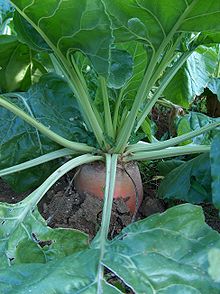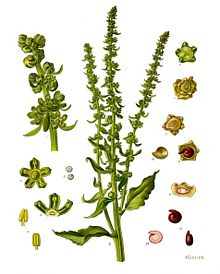- Mangelwurzel
-
Mangelwurzel 
Beta vulgaris subsp. vulgaris var. alba 
Scientific classification Kingdom: Plantae (unranked): Angiosperms (unranked): Eudicots (unranked): Core eudicots Order: Caryophyllales Family: Amaranthaceae Subfamily: Betoideae Genus: Beta Species: B. vulgaris Binomial name Beta vulgaris
L.Mangelwurzel or mangold wurzel (from German Mangel/Mangold, "chard", and Wurzel, "root"), also called mangold,[1] mangel beet,[1] field beet[2] and fodder beet, is a cultivated root vegetable derived from Beta vulgaris. Its large white, yellow or orange-yellow swollen roots were developed in the 18th century as a fodder crop for feeding livestock.
Contents
Usage
Contemporary use is primarily for cattle, pig and other stock feed, although it can be eaten - especially when young - by humans. Considered a crop for cool-temperate climates, the mangelwurzel sown in autumn can be grown as a winter crop in warm-temperate to sub-tropical climates. Both leaves and roots may be eaten. Leaves can be lightly steamed for salads or lightly boiled as a vegetable if treated like English spinach. Grown in well-dug, well-composted soil and watered regularly, the roots become tender, juicy and flavoursome. The roots are prepared boiled like potato for serving mashed, diced or in sweet curries. Animals are known to thrive excellently upon this plant, both its leaves and roots providing a nutritious food. Mangelwurzel may require supplementary potassium (aka potash) for optimum yields, flavour and texture and foliage readily displays potassium deficiency as interveinal chlorosis. In 19th-century American usage they were sometimes referred to as 'mango.'
The 1830 book "The Practice of Cookery" includes a recipe for a beer made with mangelwurzel.[3]
In popular culture
The mangelwurzel has a history in England of being used for sport (mangold hurling), for celebration, for animal fodder and for the brewing of a potent alcoholic beverage.
The mangelwurzel is featured in the 1984 novel Jitterbug Perfume written by Tom Robbins. The main character Alobar originally hails from a Slavic nation where beets are quite prevalent, and eventually the mangel wurzel is used as the base note in the mysterious perfume from which the book derives its name.
The manglewurzel also had a role in the cult TV kids show as Wurzel Gummidge's head, where it could often be heard to say things like "go boil your head."
A mangelwurzel hurling championship was revived in the north Wiltshire village of Sherston on October 7, 2006. Teams of three hurled mangelwurzels in turn, aiming to be the closest to a large leafless mangelwurzel known as 'the Norman'.
It is also the source of the name for the English folk/pop/comedy/scrumpy and western musical group The Wurzels.
Most city-dwellers in England have only the vaguest idea of what a mangelwurzel is, and tend to associate the vegetable with the stereotypical country bumpkin character in comedy. The word is even used as a double-entendre, for example by the character Rambling Syd Rumpo (Kenneth Williams). As usual, some entertainers from country towns embrace the stereotype, as above.
Children may encounter it in the book Muddle Earth (2003) by Paul Stewart and Chris Riddell,[citation needed] in which the mangelwurzel is both a major part of the diet and the principal form of currency (turnips and other vegetables are also acceptable) for trolls.
The mangelwurzel is mentioned as an occasional source of food for the starving inmates of Stalag prison camp in the book Dropped In It by Colin Hall.
In South Somerset, on the last Thursday of October every year, Punkie Night is celebrated. Children carry around lanterns called "Punkies", which are hollowed out mangelwurzels. (Mangelwurzels are also carved out for Halloween in Norfolk and Wales)
John Le Marchant recommends cutting the "mangel-wurzel" to learn the proper mechanics for a Draw Cut with the Broadsword in his historic manual.
George Orwell mentions "mangel-wurzels" as an example of "Riches more than mind can picture" for the beasts, in the song Beasts of England in his book Animal Farm (1945).
In the The Bowmans episode of Hancock's Half Hour, Tony Hancock's character Joshua sings a song about mangelwurzels, "I've got mangelwurzels in me garden, I've got mangelwurzels in me shed, I've got mangelwurzels in me bathroom, and a mangelwurzel for a head".
Notes
- ^ a b Wright, Clifford A. (2001) Mediterranean vegetables: a cook's ABC of vegetables and their preparationin Spain, France, Italy, Greece, Turkey, the Middle East, and north Africa with more than 200 authentic recipes for the home cook Harvard Common Press, Boston, Massachusetts, page 52, ISBN 1-55832-196-9
- ^ Raynbird, Hugh (1851) "On the Cultivation of Mangold-wurzel or Field-beet" Transactions of the Highland and Agricultural Society of Scotland New Series pp. 534-38, page 534
- ^ Dalgairns (1830) The practice of cookery: adapted to the business of every day life (third edition) Cadell & Company, Edinburgh, Scotland, page 498, OCLC 24513143
See also
- Beet
- Beetroot
- Chard
- The Wurzels, a British band
- Worzel Gummidge, a British book
External links
- 1911 Encyclopedia Britannica article
- The Guardian online report on Post Office closures, during which protesters used Mangelwurzel lanterns as a symbol of village tradition
Categories:- Amaranthaceae
- Root vegetables
- German loanwords
- Fodder
Wikimedia Foundation. 2010.
